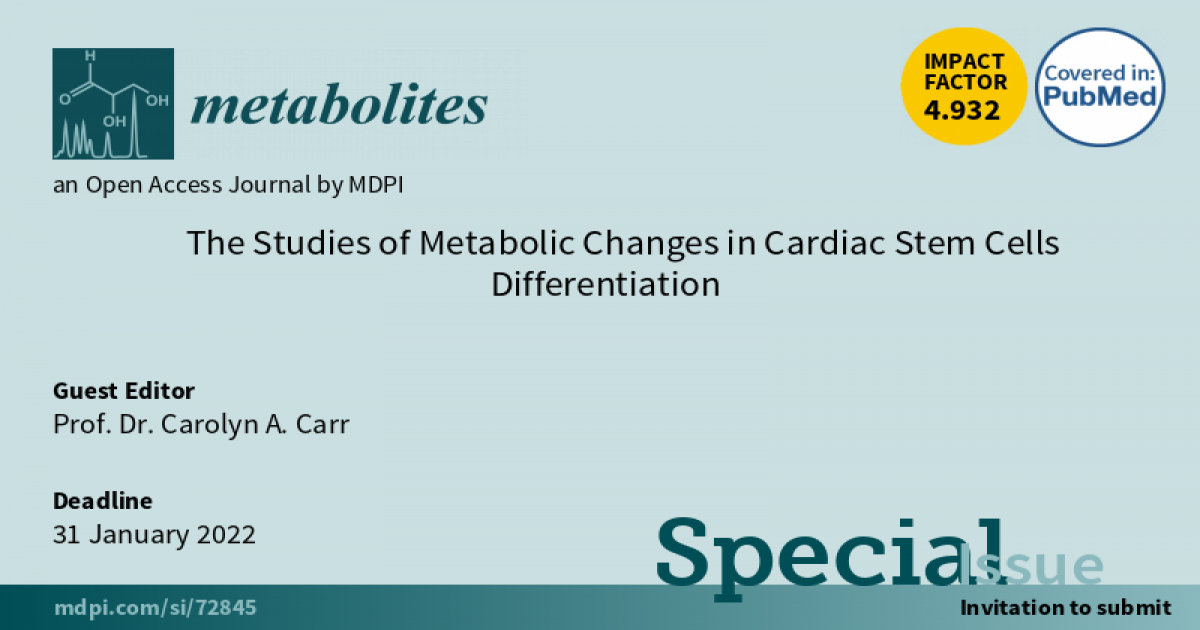The Studies of Metabolic Changes in Cardiac Stem Cells Differentiation
A special issue of Metabolites (ISSN 2218-1989). This special issue belongs to the section "Cell Metabolism".
Deadline for manuscript submissions: closed (31 January 2022) | Viewed by 13308

Special Issue Editor
Interests: cardiac physiology and metabolism; endogenous cardiac stem cells to prevent heart failure; MR spectroscopy and mass spectrometry; metabolic changes in stem cells as they differentiate
Special Issue Information
Dear Colleagues,
The development of techniques to differentiate pluripotent stem cells into heart cells and keep them in the lab for many weeks has opened up the possibility of testing the effect of drugs or of genetic disorders on the heart in human cardiomyocytes. However, pluripotent stem cell-derived cardiomyocytes are immature and have not developed all the proteins and signaling pathways of the adult heart. A range of techniques have been used to induce maturation of stem cell-derived cardiomyocytes so that they fully recapitulate the phenotype of the adult heart, including genetic approaches, mechanical and/or electrical stimulation, 3D culture and modification of the cell culture medium. Only recently have the induction of metabolic changes and their measurement been taken into consideration.
This special issue of Metabolites will be dedicated to studies which focus on metabolic changes in differentiating cardiomyocytes, both those from pluripotent stem cells and from endogenous progenitors, Both research articles and reviews are welcome and topics can include the use of metabolic stimuli to induce maturation; the characterization of metabolic changes during differentiation; modelling metabolic disorders in vitro and techniques to characterize metabolism in stem-cell derived cardiomyocytes.
Dr. Carolyn A. Carr
Guest Editor
Manuscript Submission Information
Manuscripts should be submitted online at www.mdpi.com by registering and logging in to this website. Once you are registered, click here to go to the submission form. Manuscripts can be submitted until the deadline. All submissions that pass pre-check are peer-reviewed. Accepted papers will be published continuously in the journal (as soon as accepted) and will be listed together on the special issue website. Research articles, review articles as well as short communications are invited. For planned papers, a title and short abstract (about 250 words) can be sent to the Editorial Office for assessment.
Submitted manuscripts should not have been published previously, nor be under consideration for publication elsewhere (except conference proceedings papers). All manuscripts are thoroughly refereed through a single-blind peer-review process. A guide for authors and other relevant information for submission of manuscripts is available on the Instructions for Authors page. Metabolites is an international peer-reviewed open access monthly journal published by MDPI.
Please visit the Instructions for Authors page before submitting a manuscript. The Article Processing Charge (APC) for publication in this open access journal is 2700 CHF (Swiss Francs). Submitted papers should be well formatted and use good English. Authors may use MDPI's English editing service prior to publication or during author revisions.
Benefits of Publishing in a Special Issue
- Ease of navigation: Grouping papers by topic helps scholars navigate broad scope journals more efficiently.
- Greater discoverability: Special Issues support the reach and impact of scientific research. Articles in Special Issues are more discoverable and cited more frequently.
- Expansion of research network: Special Issues facilitate connections among authors, fostering scientific collaborations.
- External promotion: Articles in Special Issues are often promoted through the journal's social media, increasing their visibility.
- Reprint: MDPI Books provides the opportunity to republish successful Special Issues in book format, both online and in print.
Further information on MDPI's Special Issue policies can be found here.






